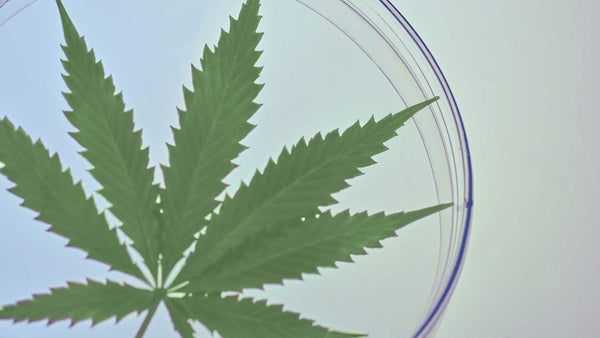If you thought hemp and marijuana were the same thing – you are not alone. When it comes to understanding the difference between hemp and marijuana, it can get a little confusing and details are often improperly explained. With a greater amount of hemp products in the market, from supplements to beauty products, it is important to understand the exact nature of what you are buying. We aim to deconstruct this confusion and explain to you what hemp really is and dive a little into the history of cannabis, so that you can choose wisely and confidently.
Understanding the Difference: What Is Hemp? What Is Marijuana?
Before we lay out all of the differences between hemp and marijuana, it is important to note that one of the big similarities that probably leads to the confusion between the two is that they are both derived from the Cannabis plant.
Both hemp and marijuana are, in fact, taxonomically the same plant. This means that they are different names for the same genus, which would be Cannabis. But while marijuana comes from both the cannabis indica or cannabis sativa plant, hemp belongs solely to the cannabis sativa family.
A Brief History of Cannabis
 The history of cannabis has been a turbulent one, and one that still faces confusion and misunderstanding. Due to how closely related the plants are, the government outlawed hemp and hemp seeds at the same time marijuana was made illegal. Cannabis was an early target of the “War on Drugs” in the 1970’s, and led to the misconception around hemp, lumping both hemp and marijuana into the same conversation.
The history of cannabis has been a turbulent one, and one that still faces confusion and misunderstanding. Due to how closely related the plants are, the government outlawed hemp and hemp seeds at the same time marijuana was made illegal. Cannabis was an early target of the “War on Drugs” in the 1970’s, and led to the misconception around hemp, lumping both hemp and marijuana into the same conversation.
Hemp was legalized in the United States in 2018 through the Farm Bill, which lifted the provisions on hemp that were previously classified as a drug on par with heroin. In the Agricultural Act of 2018, the definition was further changed to describe the non-intoxicating forms of Cannabis that is used specifically for its industrial uses. Hemp can produce essential resources in everyday textiles, industrial textiles, building materials, as well as health and body care. Because hemp is mostly the fiber of the plant, there is evidence of its uses throughout history up to 10,000 years ago. Early evidence shows hemp in rope and other industrial materials.
Today, hemp affords many legalities that marijuana does not. For instance, products made from hemp – including medicine, wellness, clothing and body care – can be purchased almost anywhere in stores and online. In fact, hemp is now known to have over 20,000 different applications, with a ton of innovation expected over the years to come.
Does Hemp Have THC?
 A key difference between hemp and marijuana lies within - meaning, within their chemical composition. The cannabis genus is made up of over 110 known cannabinoids and hemp and marijuana’s cannabinoid profile is characteristically different. The greatest determination for whether the plant is hemp or marijuana depends on the spectrums and concentrations of psychoactive compound, THC.
A key difference between hemp and marijuana lies within - meaning, within their chemical composition. The cannabis genus is made up of over 110 known cannabinoids and hemp and marijuana’s cannabinoid profile is characteristically different. The greatest determination for whether the plant is hemp or marijuana depends on the spectrums and concentrations of psychoactive compound, THC.
Tetrahydrocannabinol (THC) is the chemical responsible for the intoxicating effects of marijuana, otherwise known as a high. So while marijuana is mostly made up of THC (sometimes reaching as high as 30%), hemp is made up of less than 0.3% THC. In other words, hemp won’t produce a high, which is great if that’s something you’d prefer to avoid.
Benefits of Hemp
Hemp is incredibly versatile and the entire hemp plant can be used in a myriad of ways. Follow along as we deconstruct some of the most popular uses of hemp.
Hemp Stalk: Using Hemp for Fiber and Hurds
The hemp plant’s stalk, also referred to as the stem, provides fiber and hurds. Fiber is used to produce textiles, rope, plastics and even building insulation. Hurds are used to create paper, fiber boards, and organic compost.
Hemp Seeds: Using Hemp for Food and Beauty Products
One of the most common uses is hemp seed oil, which is full of omega 3 and omega 6 fatty acids and other vitamins and minerals. You can use hemp seed oil in salad dressings and other cold dishes - we don’t recommend using it for cooking as it has a very low smoking point.
Other uses for hemp seeds are sprinkling them as is on protein bars, in smoothies, even sneaking it into your baked goods! You can have hemp milk, hemp butter, flour and protein powder. Why should you give hemp seed products a try? Because they’re incredibly rich in dietary fibers, protein, vitamins and minerals!
Hemp-derived CBD vs Marijuana-derived CBD
 Now that we’ve established you will not get high from hemp, let’s shift focus to the properties of hemp that give way to CBD. While the CBD compound is the same from both marijuana-derived CBD and hemp-derived CBD, they differ in the amount of cannabinoid content and effect profiles.
Now that we’ve established you will not get high from hemp, let’s shift focus to the properties of hemp that give way to CBD. While the CBD compound is the same from both marijuana-derived CBD and hemp-derived CBD, they differ in the amount of cannabinoid content and effect profiles.
Cannabinoid Content and Effect Profiles
Hemp-derived CBD extract typically consists of a higher concentration of CBD and a THC level of 0.3% or less. Marijuana-derived CBD can come with significantly higher amounts of THC, going from 5% to as high as 30%. Bottom line: if you want CBD without any THC, hemp-derived CBD is your best best.
Those wishing to avoid THC should go with a CBD isolate product made from hemp rather than a full-spectrum CBD. A CBD isolate is the purest form of CBD - it contains around 99% cannabidiol without any additional cannabinoids, terpenes and plants components. In contrast to isolates, full-spectrum CBD retains the full spectrum of cannabinoids and has its own set of benefits such as the “entourage effect”, arguing that THC, even in small amounts below 0.3%, can help increase efficacy thru the bond with CB1 and CB2 receptors. To simplify, the “entourage effect” says that the plant works best as it was naturally grown. With all the different types of CBDs, it’s ultimately up to you to decide which is your preferred choice.
Though there is still some confusion around hemp and marijuana, it is important to understand that there is in fact a great difference in their application, usage, and chemical components. To put it simply, marijuana will get you high and hemp will not. Hemp also is an incredible utilitarian plant used all over the world and noted for its nutritious benefits. To confuse hemp and marijuana would be akin to confusing lemons and oranges. Understanding how they are dissimilar can be critical in helping inform you on how you use hemp and marijuana products in your life.



